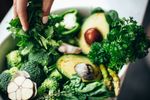The winter squash packs a lot of health benefits into its festive-looking package.
When fall hits, a certain harvest celebrity hogs center stage: pumpkin, along with its closest squash cousins. "From muffins to pies to lattes, pumpkin finds its way into every treat. But the actual pumpkin flesh itself (minus the added sugar) is chock-full of vitamins, minerals, antioxidants and fiber,” says registered dietitian Laura Burak, MS, RD.
Below, everything you need to know about the health benefits of pumpkin — plus, two simple recipes that you'll want to add to your plate this fall (and beyond).
Pumpkin Nutrition
While its popularity peaks in the fall, pumpkin’s powerful nutrition should encourage you to keep it in your kitchen all year long. "Pumpkins are a good source of vitamin A, vitamin C, fiber, potassium, manganese, iron, copper and antioxidants," says Robin Barrie Kaiden, MS, RD, CDN. For all the nutrients they contain, they’re also low in calories, which may be in part due to their high water content — they're around 90 percent H2O, according to the University of Illinois Extension. In other words, the seasonal squash is composed nearly entirely of water, making it incredibly hydrating.
Pumpkin’s rich orange hue also signals its health properties. "That orange pigment is called beta carotene, which the body converts to vitamin A, an essential nutrient for skin, eye and cognitive health as well as immunity,” says Burak. And get this: According to the U.S. Department of Agriculture (USDA), 1 cup of the canned variety offers 209 percent of the reccomended daily value of the nutrient. Pretty impressive, huh?
Health Benefits of Pumpkin
Protects Against Chronic Conditions
Pumpkin, and other winter squash, contain key antioxidants — like alpha-carotene, beta-carotene and beta-cryptoxanthin — that help fight damage done by free radicals (i.e. unstable molecules) and “protect against chronic diseases like cancer and heart disease,” explains Burak. Our body’s metabolic processes naturally create free radicals; however, too many free radicals floating around the body can wreak havoc on cells and increase the risk of disease. Luckily, antioxidants (such as those in good ol' pumpkin) curb that damage.
You might want to dry the seeds on a low temp in the oven with a little salt and pepper and eat them too. They're also “high in antioxidants and good for heart health,” says Kaiden.
Bolsters Your Immune System
Due to their high vitamin content, pumpkins are also great for your immune system. As mentioned above, the fall favorite is full of vitamins A and C. The former has been shown to strengthen the immune system and even help fight infections. And the latter? Vitamin C "promotes the production of white blood cells, which help the body fight off infections," Valerie Agyeman, RD, previously told THE WELL.
Supports Healthy Digestion
When it comes to the health benefits of pumpkin, you can’t forget about fiber — an essential nutrient that plays a big role in maintaining healthy digestion. Pumpkin contains both soluble and insoluble fiber, says Lauren Burkowski, MS, Health Coach at THE WELL New York. Soluble fiber dissolves in water and forms a gel-like substance that can absorb excess fluid, easing gastrointestinal troubles, such as diarrhea. Insoluble fiber, on the other hand, adds bulk to stool and keeps it moving through the digestive tract, preventing or relieving constipation, she explains.
And while the squash's high fiber content is sure to keep your system running smoothly, all that water hiding in each orange orb can help with your bathroom habits too.
RELATED: Decoding Your Digestion
Staves Off Heart Disease
Helping you stay regular isn’t the only thing the fiber in pumpkins can do — it can also keep your ticker in tip-top shape. Soluble fiber, in particular, can bind to cholesterol in the GI tract, bringing it along as it makes its way through the gut. When the fiber leaves the body via stool, so does the cholesterol, thereby preventing it from entering the bloodstream and increasing potentially harmful cholesterol levels, which could otherwise increase your risk of heart disease, explains Burkowski.
Promotes Relaxation
Pumpkins also contain high amounts of magnesium, which helps relax the nervous system and aid in muscle recovery. The seeds may even help you catch a more restful night of sleep. “Their tryptophan (an amino acid often associated with turkey) and magnesium enhance sleep quality,” explains Kaiden.
What to Look for When Picking
While every pumpkin is technically edible, the best ones for cooking aren’t the ones you use for carving jack-o-lanterns. Pumpkins labeled “sugar” or “pie” are generally sweeter and ideal for incorporating in dishes. But don’t limit yourself to only using the classic orange pumpkin. The botanical distinction between pumpkins and other sweet winter squash is so slight that their flavors don’t differ much. In fact, canned pumpkin is often a mix of pumpkin and other “golden-fleshed, sweet squash,” according to the Food and Drug Administration.
If buying other kinds of squash, choose ones with thinner skins (like delicata, kabocha and red kuri) earlier in the season since thinner skins means they’re more perishable, says Laura Allen, professional chef and Director of Food and Beverage at THE WELL New York, who notes that you can eat also eat skins, which contain extra nutrients.
“Save the thicker-skinned squash that you have to peel (butternut, acorn, hubbard and spaghetti varieties) for later in the winter when that's all that is available,” suggests Allen, who offers these three picking tips:
- Find one that is heavy for its size without any soft spots
- Look for matte (not shiny) skin, which signifies ripeness
- Avoid any item that has been coated (sometimes wax is used for preservation during transportation)
RELATED: THE WELL Q&A: Laura Allen
How to Add Pumpkin to Your Plate
Luckily, there are countless ways to enjoy the benefits of pumpkins and other winter squash. The easiest? Pure pumpkin pureé! “A scoop right from the can is an excellent way to add vitamin A, beta carotene and fiber to muffin and cookie mixes, smoothies, oatmeal, yogurt, chia pudding and more,” says Burak. Just make sure you aren’t buying pumpkin pie filling, which has added sugar. “There should just be one ingredient, and that's pumpkin!” says Burak.
“Pumpkin pureé can also double as a butter, oil and egg replacer when modifying recipes for dietary restrictions,” says Maggie Michalczyk, RD, creator of Once Upon a Pumpkin. Just swap one egg for 1/4 cup pumpkin pureé.
Need some inspiration? Below, a few delicious ways pumpkin and squash have been used at THE WELL Kitchen & Table in New York City during the fall.
Pumpkin Recipes
Roasted Kabocha
Ingredients:
- 1 kabocha squash (Japanese pumpkin)
- 2 tbsp salt
- 2 tbsp extra virgin olive oil
Directions:
- Cut squash in half from stem to stem. Scoop seeds out and cut in half radially. Then cut each quarter into 4-6 wedges depending on squash size.
- Roast in the oven at 375 degrees F until tender.
- Cool and store until ready to serve.
Spicy Pepitas
Ingredients:
- 1 cup pumpkin seeds (either shelled or with husk on)
- 1/2 tsp korean chili flakes
- Sprinkle of salt
- 2 tsp orange juice
Directions:
- Toss seeds in a bowl with chili flakes, salt and orange juice.
- Bake at 350 degrees F for 10 minutes. Roast a bit longer if using seeds with the husks still on.





